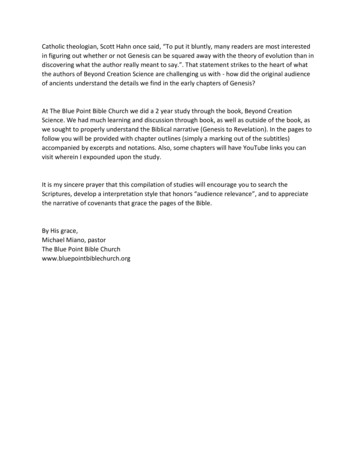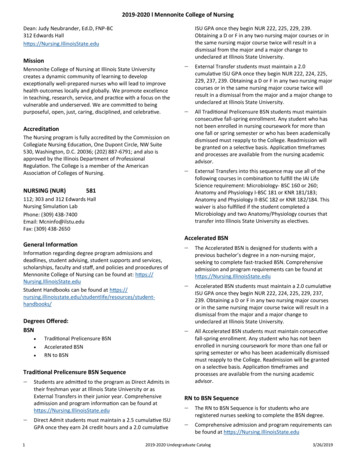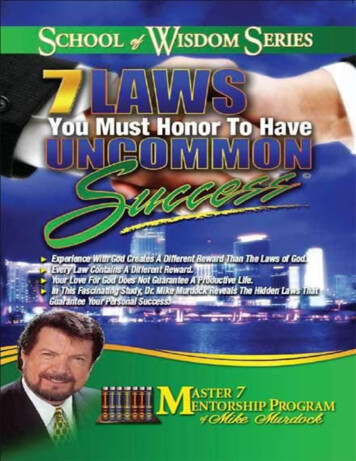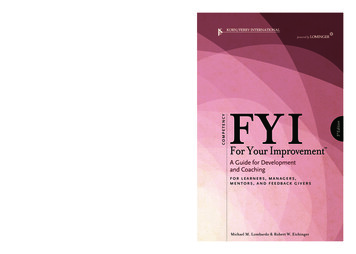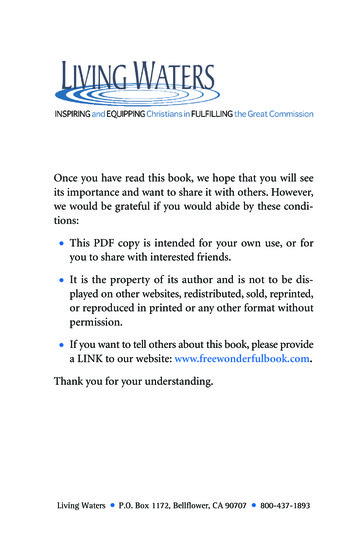
Transcription
Once you have read this book, we hope that you will seeits importance and want to share it with others. However,we would be grateful if you would abide by these conditions: This PDF copy is intended for your own use, or foryou to share with interested friends. It is the property of its author and is not to be displayed on other websites, redistributed, sold, reprinted,or reproduced in printed or any other format withoutpermission. If you want to tell others about this book, please providea LINK to our website: www.freewonderfulbook.com.Thank you for your understanding.Living Waters P.O. Box 1172, Bellflower, CA 90707 800-437-1893
“I served Dr. Bill Bright as his theological editor, and wasprivileged to work with him for seven years . . . Before youbegin chapter one of this book, let me ask you to set aside anypreconceived thoughts you have about personal evangelism andjudge everything you read according to the Scriptures.”—F ROM THE F OREWORD BY JOHN BARBER, PH.D. Why do 9 out of 10 children raised in Christian homes leave the Church?Why do many professing Christians show little or no evidence for their faith?Why do 80–90% of those making decisions for Christ fall away from the faith?For decades, the world’s most popular gospel message has beendrawing the lost by promising God’s wonderful plan for theirlife. But behind the façade of the “wonderful plan” message is thereality of the trials, temptation, and persecution that Jesus promised.How can we reconcile the two?In this life-changing book, best-selling author Ray Comfortexplores whether this common gospel approach aligns with real life—and with Scripture. The vital biblical principles he reveals will forceyou to reexamine your ideas about the gospel—and will teach youhow to reach unbelievers the way God intended. A must-read for allwho care about the lost.“This book rocked my world! It forever changed my view of thegospel and ignited a passion for the lost.” —Kirk CameronRAY COMFORT is the author of more than 70 books, including The Evidence Bible, aGold Medallion Award finalist. He has a syndicated radio program with MoodyRadio and is the co-host (with actor Kirk Cameron) of the award-winning televisionprogram “The Way of the Master.” His teachings have been commended by JohnMacArthur, Josh McDowell, Ravi Zacharias, Franklin Graham, D. James Kennedy,R. C. Sproul, Charles Stanley, David Jeremiah, Lee Strobel, George Barna, JerryFalwell, Joni Eareckson Tada, and many other Christian leaders.Living Waters PublicationsP.O. Box 1172Bellflower, CA 90707www.livingwaters.com“A Shattering Publication!” —Leonard Ravenhill
“I served Dr. Bill Bright as his theological editor, and wasprivileged to work with him for seven years . . . Before youbegin chapter one of this book, let me ask you to set aside anypreconceived thoughts you have about personal evangelism andjudge everything you read according to the Scriptures.”—F ROM THE F OREWORD BY JOHN BARBER, PH.D. Why do 9 out of 10 children raised in Christian homes leave the Church?Why do many professing Christians show little or no evidence for their faith?Why do 80–90% of those making decisions for Christ fall away from the faith?For decades, the world’s most popular gospel message has beendrawing the lost by promising God’s wonderful plan for theirlife. But behind the façade of the “wonderful plan” message is thereality of the trials, temptation, and persecution that Jesus promised.How can we reconcile the two?In this life-changing book, best-selling author Ray Comfortexplores whether this common gospel approach aligns with real life—and with Scripture. The vital biblical principles he reveals will forceyou to reexamine your ideas about the gospel—and will teach youhow to reach unbelievers the way God intended. A must-read for allwho care about the lost.“This book rocked my world! It forever changed my view of thegospel and ignited a passion for the lost.” —Kirk CameronRAY COMFORT is the author of more than 70 books, including The Evidence Bible, aGold Medallion Award finalist. He has a syndicated radio program with MoodyRadio and is the co-host (with actor Kirk Cameron) of the award-winning televisionprogram “The Way of the Master.” His teachings have been commended by JohnMacArthur, Josh McDowell, Ravi Zacharias, Franklin Graham, D. James Kennedy,R. C. Sproul, Charles Stanley, David Jeremiah, Lee Strobel, George Barna, JerryFalwell, Joni Eareckson Tada, and many other Christian leaders.Living Waters PublicationsP.O. Box 1172Bellflower, CA 90707www.livingwaters.com“A Shattering Publication!” —Leonard Ravenhill
Living Waters PublicationsBellflower, CA
God Has a Wonderful Plan for Your Life:The Myth of the Modern MessageLiving Waters PublicationsP.O. Box 1172Bellflower, CA 90707, USAwww.livingwaters.com 2010 by Ray Comfort. All rights reserved. No part of thispublication may be reproduced, stored in a retrieval system, ortransmitted by any means—electronic, mechanical, photographic (photocopying), recording, or otherwise—withoutprior permission in writing, unless it’s for the furtherance ofthe gospel and given away free.Edited by Lynn CopelandCover, page design, and production by Genesis GroupCover illustration by Gustave Doré, The Doré Bible Illustrations,Dover Publications, Inc.; modified by Dale JacksonPrinted in the United States of AmericaISBN 978-1-878859-49-5Unless otherwise indicated, Scripture quotations are from theNew King James version, 1979, 1980, 1982 by Thomas NelsonInc., Publishers, Nashville, Tennessee.Scripture quotations designated AMP are from The AmplifiedBible, 1958, 1987 by The Lockman Foundation, La Habra,California.Scripture quotations designated TLB are from The Living Bible, 1971 by Tyndale House Publishers, Inc., Wheaton, Illinois.Scripture references designated KJV are from the King JamesVersion.Unless otherwise noted, emphasis within Scriptures and otherquotations has been added by the author.
CONTENTSForeword, by Dr. John Barber . . . . . . . . . . . . . . . . . . . . .51 Phenomenal Growth . . . . . . . . . . . . . . . . . . . . . . . . . .92 The Way Out of Problems? . . . . . . . . . . . . . . . . . . . .213 The Happiness Dilemma . . . . . . . . . . . . . . . . . . . . . .334 The Lost Key . . . . . . . . . . . . . . . . . . . . . . . . . . . . . . .455 Making Grace Amazing . . . . . . . . . . . . . . . . . . . . . . .576 The Motive and the Result . . . . . . . . . . . . . . . . . . . .697 What Did Jesus Do? . . . . . . . . . . . . . . . . . . . . . . . . . .838 Raiders of the Contents of the Lost Ark . . . . . . . . .99Appendix: For My Campus Crusade Friends . . . . . . . .109Endnotes . . . . . . . . . . . . . . . . . . . . . . . . . . . . . . . . . . . . .125Resources . . . . . . . . . . . . . . . . . . . . . . . . . . . . . . . . . . . .1283
F OREWORDne cannot fully understand what one is saved tounless one also understands what one is saved from.We are saved from the consequences of our sins, which ishell. Jesus said, “If your hand causes you to stumble, cut itoff; it is better for you to enter life crippled, than, havingyour two hands, to go into hell, into the unquenchablefire” (Mark 9:43). It was with the knowledge of hell thatJesus graciously and lovingly called people to repent oftheir sins and to trust him as Lord and Savior. He thusbegan his public ministry proclaiming, “The time is fulfilled, and the kingdom of God is at hand; repent andbelieve in the gospel” (Mark 1:15).It is an unfortunate commentary, but we are living ina day when the saving message of Jesus Christ is beinglost in our churches. Replacing it is a new set of concernsthat are quick to speak of God’s love, mercy, and grace,but are slow to take up the implications of His holiness,judgment, and wrath. Being disturbingly silent on thesignificant issues of sin and judgment to come, muchcontemporary evangelism is producing a bumper-crop ofunregenerate believers.The erosion of gospel values first came to my attention years ago as a young proclamation evangelist inConnecticut. I was shocked to discover the extent to whichthe “softer, gentler” vision of God, heralded by the earlyO5
GOD H AS A WONDERFUL P LAN FOR YOUR L IFEnineteenth-century Universalist William Ellery Channing,continued to inoculate scores of New England churchesto the Christ of the Bible.Years later, I served Dr. Bill Bright as his theologicaleditor, and was privileged to work with him for sevenyears. Dr. Bright was well aware of the dangers awaitingthe unconverted. Toward the end of his life, his greattrepidation for the lost led him to author two additionalbooks: one on the Ten Commandments, and another onthe vital subjects of heaven and hell. I was delighted thathe was addressing such important topics. The hours Ispent editing those two books further solidified in myheart the importance for people to be exposed to the genuine gospel of Jesus Christ.About the same time, I discovered the evangelism ofRay Comfort. Upon watching his videos, which includeKirk Cameron, it became clear to me that Ray had hisfinger on the problem. He had made a monumentaladvance in reclaiming the evangel—all of which he hadcondensed in an exciting and easy-to-learn approachcalled “The Way of the Master.”Once I became the pastor of a church, I couldn’t waitto implement Ray’s materials. So far, I have been privileged to lead our people in several training sessions of“The Way of the Master.” The results have been nothingshort of remarkable. Not only have trainees developed agreater understanding of the gospel, and a love for thelost, but also we have exposed scores of people to thegospel with the result that many have become Christians.I am also encouraged that some of these new believershave joined our church and are now active participants.6
ForewordThere are many ways to articulate the gospel. Butbefore you begin chapter one of this book, let me ask youto set aside any preconceived thoughts you have aboutpersonal evangelism and judge everything you readaccording to the Scriptures. I believe that you will findhere an approach that takes its cue from the very wayJesus of Nazareth called people to the family of God.JOHN BARBER, PH.D.7
Chapter 1P H ENOMENALGROWTHe live in exciting times. All around us we are seeingthe phenomenal rise of megachurches with congregations in the tens of thousands; pockets of revivalhave sprung up in the United States and other parts ofthe world; and we have heard of millions of people inRussia, China, and Africa coming to the Savior.One evangelist, for example, claims that his worldwide tour has led nearly 1 million people to make decisions for Christ since 2007.1 A denomination reportednearly 2.5 million decisions for Christ in 2008.2 Oneinternational organization reported over 10 million decisions for Christ in 2009,3 and another ministry has seenan incredible “45 million documented salvations” worldwide in just six years.4These are indeed exciting times.Yet, with all the excitement about the growth of thecontemporary Church, it seems that many have overlooked a few statistical inconsistencies. Before we look atthese, I am reminded of a doctor who said to his patient,“I have some very bad news for you. Your heart is extremely weak, and any bad news could kill you.” So, howis your heart? I have some really bad news for you. As youhear it, please be consoled that there is a cure.W9
GOD H AS A WONDERFUL P LAN FOR YOUR L IFEAn October 2003 survey conducted by the BarnaGroup found that 45 percent of those who profess to beborn-again Christians believed that gambling was morallyacceptable. According to the survey, 49 percent believedthat “living with someone of the opposite sex withoutbeing married” was morally okay. Just under half of thosequestioned (49 percent) were comfortable with “enjoyingsexual thoughts or fantasies about someone,” while onethird (33 percent) of those professing to be born againthought that it was okay to kill a baby while it is still inthe womb.5In 2001, a survey conducted by the Alan GuttmacherInstitute in New York found that “13 percent of abortionpatients describe themselves as born-again or evangelicalChristians.”6 That is, of all those who actually murderedtheir own unborn children, nearly one in eight professedfaith in Jesus Christ. That is difficult to reconcile with thefact that Christians are supposed to love God and loveothers as much as they love themselves.Additionally, according to an article titled “PornNation” in World Magazine, of the men belonging to theChristian organization Promise Keepers (who make apromise to be “committed to practicing spiritual, moral,ethical, and sexual purity”), 53 percent visit porn sitesevery week.7 This alarming finding is not confined to thepews. An Internet survey of 6,000 pastors conducted in2002 found that 30 percent of pastors had viewed Internetporn in the last 30 days.8 This is despite the fact that thesemen are to be the spiritual leaders of their flocks andtheir families.In 2009, the Barna Group found further evidence thatall is not well in the contemporary Church:10
Phenomenal GrowthAmong individuals who describe themselves asChristian, for instance, close to half believe that Satandoes not exist, one-third contend that Jesus sinnedwhile He was on earth, two-fifths say they do nothave a responsibility to share the Christian faith withothers, and one-quarter dismiss the idea that the Bibleis accurate in all of the principles it teaches.9Think for a moment of the implications of such atheology. Here we have millions of “believers” who supposedly confess that Jesus is Lord, and yet they think Hesinned. They either don’t know what the Bible teachesabout the Son of God or they believe it is inaccurate whenit says that Jesus “knew no sin” (2 Corinthians 5:21), thatHe was “in all points tempted as we are, yet without sin”(Hebrews 4:15), and that He “committed no sin, nor wasdeceit found in His mouth” (1 Peter 2:22). Furthermore,if Jesus sinned, it would mean that He was not the spotless Lamb of God the Scriptures say He was (see 1 Peter1:19); that His sacrifice was not perfect; and that whenGod accepted Jesus’ death as an atonement for our sins,He sanctioned a “contaminated payment” and is therefore corrupt by nature. Sadly, the multitudes who professfaith in Jesus, yet deny His sinless perfection, appear to bestrangers to true regeneration. The Jesus they believe inisn’t capable of saving anyone.In addition, 41 percent of self-proclaimed Christiansbelieve that “the Bible, the Koran and the Book of Mormon are all different expressions of the same spiritualtruths”10—despite the books’ vastly contradictory teachings on truth, salvation, and the nature of God. And only46 percent of born-again adults believe in the existence ofabsolute moral truth.11 So that means the other 54 percent11
GOD H AS A WONDERFUL P LAN FOR YOUR L IFEdon’t think that God has moral absolutes, which perhapsexplains why so many live their lives as though there is nomoral accountability at all.Pollster George Barna, in observing these troublingtrends, noted, “Although most Americans consider themselves to be Christian and say they know the content ofthe Bible, less than one out of ten Americans demonstrate such knowledge through their actions.”12 With over173 million Christians in the U.S.,13 there are tens of millions who say that they love God and yet they are liars,thieves, fornicators, adulterers, and child-murderers.Paul’s warning to Titus seems to be true of much of themodern Church: “They profess to know God, but inworks they deny Him” (Titus 1:16). Neither their beliefsnor their behavior aligns with biblical Christianity.Leaving in DrovesSadly, young people today are exhibiting the same theological confusion as the preceding generation. Despite 8out of 10 teens describing themselves as Christian, 61percent believe a place in Heaven can be earned throughgood works; 63 percent believe Muslims, Buddhists,Christians, Jews, and all other people pray to the sameGod; and 58 percent believe all religious faiths teachequally valid truths.14As with adults, the behavior of youth who describethemselves as Christian is virtually indistinguishablefrom that of non-Christians. An “Ethics of AmericanYouth Survey” found that in the prior 12 months 74 percent of Christian teens cheated on a test, 93 percent lied toa parent, and 63 percent physically hurt someone whenangered.15 The Barna Group also found that teens who12
Phenomenal Growthprofess to be born again and attend church regularly werejust as likely as secular teens to engage in Internet theft ofmusic and to illegally copy CDs (77 percent to 81 percent, respectively).16In a joint statement, youth specialists Josh McDowelland Ron Luce made a sobering announcement: “Incredible as it may seem, ‘accepting Christ’ and making a profession of faith makes little to no difference in a youngperson’s attitudes and behaviors. The majority of ourchurched young people are adopting ‘a Christianity’ but itis not true Christianity.” While this is a shocking admission, McDowell and Luce are not alone in their conclusion. Ninety-eight percent of youth ministers and pastorsMcDowell surveyed agree withthat assessment.17If that isn’t alarming enough, As with adults, the behavioranother trend is helping to furof youth who describether paint a bleak picture of thethemselves as Christian isstate of the American Church. Invirtually indistinguishableresearching families in the U.S.,the Southern Baptist Council on from that of non-Christians.Family Life discovered a gutwrenching statistic: “88 percent of thechildren raised in evangelical homes leavechurch at the age of 18, never to return.”18 This mass exodus is seen not just among Southern Baptist churches,but across denominational lines.19In an interview on a popular national radio program,a Christian youth leader spoke with great concern abouthow young people were “leaving the church in droves.”He had taken a survey to find out why these teenagerswere turning their backs on God, and he cited the number13
GOD H AS A WONDERFUL P LAN FOR YOUR L IFEone reason as “a lack of opportunity in the church”—implying that the Church should get its act together andgive young people more opportunities. Ask any pastor ifthere are opportunities to serve within his church, and hewill no doubt tell you of the lack of people willing toteach Sunday school, visit the sick and the elderly, go outwith the evangelism team, clean the church building, etc.Perhaps there is another reason that young people areleaving the Church in droves. As these statistics show,there are many today who name the name of Christ, butwho have failed to “depart from iniquity [lawlessness]”(2 Timothy 2:19). They are false converts who have “askedJesus into their hearts,” yet they remain unconverted because they have never truly repented.I cannot put into words the heartbreak of seeing somany spurious converts who have left the Church, and themultitudes of false converts who stay within the Church.Prolific author and pastor A. W. Tozer writes,It is my opinion that tens of thousands of people, ifnot millions, have been brought into some kind ofreligious experience by accepting Christ, and theyhave not been saved.Tozer is not alone in his conclusion. The late pastorD. James Kennedy, of Coral Ridge Ministries, made asimilar observation:The vast majority of people who are members ofchurches in America today are not Christians. I saythat without the slightest fear of contradiction. I baseit on empirical evidence of twenty-four years ofexamining thousands of people.14
Phenomenal GrowthMany of us, if asked which U.S. denomination is mostevangelistic, would point to the Southern Baptists. But intrying to determine why there is so much “evangelisticapathy” in their churches, Thom Rainer, president and CEOof LifeWay Christian Resources, found that the cause couldbe their “many unregenerate members.” Rainer stated, “Ifour research approximates eternal realities, nearly one-halfof all church members may not be Christians.”20How could this tragic situation have happened? Howcould vast numbers of people have been led to believethat they are Christians when they are not? If you havestruggled to understand why a loved one who made a“decision for Christ” has no desire for the things of God,or why so many church members show little to no evidence for their faith, there is an explanation. And there issomething you can do to change the situation.The Parabolic KeyThough the idea of false conversions may be new to us,the problem of false converts has existed since the beginning of the Church and it is actually a topic Jesus spokeoften about. For example, in Mark 4:3–8, Jesus taught thecrowd the well-known parable of the sower:“Listen! Behold, a sower went out to sow. And it happened, as he sowed, that some seed fell by the wayside; and the birds of the air came and devoured it.Some fell on stony ground, where it did not havemuch earth; and immediately it sprang up because ithad no depth of earth. But when the sun was up itwas scorched, and because it had no root it witheredaway. And some seed fell among thorns; and thethorns grew up and choked it, and it yielded no crop.15
GOD H AS A WONDERFUL P LAN FOR YOUR L IFEBut other seed fell on good ground and yielded acrop that sprang up, increased and produced: somethirtyfold, some sixty, and some a hundred.”When Jesus told His disciples the parable of the sower,they did not understand what it meant. When they askedHim about it later, He said, “Do you not understand thisparable? How then will you understand all the parables?”(Mark 4:13). In other words, if they could comprehendthe parable of the sower, they would hold the key tounlocking the mysteries of all the other parables.If there is one message that comes from the parableabout the stony ground, the thorny ground, and the goodground, it is this: When the gospel is preached, there willbe true and false conversions.Judas Iscariot, for example, was a false convert. Hewas a hypocrite—a pretender—whose desire (it seems)for riches and power choked out his affection for Christ.In terms of the parable, we would say that he was athorny-ground hearer, in whom “the cares of this world,the deceitfulness of riches, and the desires for other thingsentering in choke the word, and it becomes unfruitful”(Mark 4:19).Judas had no idea who Jesus really was. When awoman anointed Jesus with an expensive ointment in anact of sacrificial worship, Judas complained that the ointment should have been sold and the money given to thepoor (see John 12:3–6). In his estimation, Jesus of Nazareth wasn’t worth such extravagance—He was worth onlyabout thirty pieces of silver. Moreover, the Bible tells usthat Judas was lying when he said that he cared for thepoor. He was actually a thief who so lacked a healthy fearof God that he was stealing money from the collection16
Phenomenal Growthbag (see John 12:6). Nevertheless, to all outward appearances, Judas was a follower and disciple of Christ.If one grasps the principle that true and false convertswill be alongside each other in the Church, then the otherparables about the kingdom of God also make sense: thewheat and tares (Matthew 13:24–30), the good fish andthe bad fish (Matthew 13:47–50), the wise virgins and thefoolish virgins (Matthew 25:1–13), and the sheep andgoats (Matthew 25:31–46). Take, for example, the parableof the dragnet:“Again, the kingdom of heaven is like a dragnet thatwas cast into the sea and gathered some of everykind, which, when it was full, they drew to shore; andthey sat down and gathered the good into vessels, butthrew the bad away. So it will be at the end of theage. The angels will come forth, separate the wickedfrom among the just, and cast them into the furnaceof fire. There will be wailing and gnashing of teeth.”(Matthew 13:47–50)Notice that the good fish and the bad fish were in thenet together. Notice also that unbelievers are not caught inthe dragnet of the kingdom of Heaven; they remain inthe world. The “fish” that are caught are those who hearand respond to the gospel—the evangelistic “catch.” Theyremain together, the true and the false, until the Day ofJudgment.In Matthew 7:21–23, possibly the most frighteningpassage in Scripture, Jesus spoke of many who wouldconsider themselves Christians and yet not be saved. Jesuswarned, “Not everyone who says to Me, ‘Lord, Lord,’ shallenter the kingdom of heaven. . . Many will say to Me in17
GOD H AS A WONDERFUL P LAN FOR YOUR L IFEthat day, ‘Lord, Lord, have we not prophesied in Yourname, cast out demons in Your name, and done manywonders in Your name?’ And then I will declare to them,‘I never knew you; depart from Me, you who practicelawlessness.’”Look at how seemingly spiritual people can be andstill not make it to Heaven: They called Jesus “Lord.” They prophesied in His name. They cast out demons. They did many “wonders” in His name.These people are more spiritual than most of us, andyet they will be rejected by the One they call “Lord.” Falseconverts do have a measure of spirituality. Judas certainlydid. He had apparently convinced the other disciples thathe truly cared for the poor. And he seemed so trustworthythat he was the one who looked after the finances. WhenJesus said, “One of you will betray Me,” the disciples didn’tpoint the finger at Judas; instead, they suspected themselves, saying, “Lord, is it I?” That’s why it’s not surprisingthat so few within the Church today would suspect that weare surrounded by those who fall into the “Judas” category.I would like to caution you at this point: In case youthink the problem of false converts affects only those“other churches,” let me say that statistics show otherwise.As we will see in a subsequent chapter, 80–90 percent ofthose making decisions for Christ—whether through largecrusades or local church efforts—will fall away. We willexplore numerous statistics later, but here is one example:18
Phenomenal GrowthIn the March/April 1993 issue of American Horizon, amajor U.S. denomination disclosed that in 1991, 11,500churches had obtained 294,784 decisions for Christ. Unfortunately, they could find only 14,337 in fellowship.This means that, despite the usual intense follow-up, theycould not account for approximately 280,000 (95 percent)of their “converts.”For a more personal example, consider one individual’saccount following a crusade:Our church, which participated at every stage, received about 25 names for follow-up. These weremostly people in our area who did not identify witha church. We were instructed that many of these decisions might be fuzzy about what happened at the crusade and we should make sure they really understoodthe gospel. But, we had cold receptions and not evenenough interest to even begin the recommended Biblestudy class for new believers. To my knowledge noneof those twenty-five even visited our church afterseveral contacts and pastoral visits.21With the vast majority of “converts” falling away, couldsome of those whom you have led to the Lord be amongthe “many” who will hear Jesus say, “Depart from Me”? Asmuch as any of us would be horrified to think we are creating “Judases,” it is likely that you too may be leadingpeople into false conversions through your evangelismefforts. The Body of Christ is not as healthy as we mightlike to believe—and the problem is systemic. Something isradically wrong. Before we look at the remedy, however,we must consider the cause. For the sake of the lost,please keep reading.19
Chapter 2TH E WAY OUTOF P ROBLEMS?n light of the alarming statistics cited in the previouschapter, few would deny that the Church as a whole hasfallen short of the powerful, disciplined, sanctified Churchseen in the Book of Acts. This is a result of the enemy subtly diverting our attention away from our core message.Instead of preaching the Good News that sinners can bemade righteous in Christ and escape the wrath to come,we have settled for a “gospel” that implies that God’s primary purpose in saving us is to unfold a “wonderful plan”for our lives: to solve our problems, make us happy inChrist, and rescue us from the hassles of this life.You may know someone who responded to the “Godhas a wonderful plan” message and who seems to bedoing just fine. If you think that justifies the method, letme share a perspective you may not have considered.Imagine that someone invented a parachute that was100 percent trustworthy; the chute opened every time,without exception, and got the wearer safely to the ground.The key was to diligently follow the manufacturer’s instructions. Now imagine that the packers began to ignorethe instructions and use a new “fast-and-easy” method offolding that greatly increased production. Everyone rejoicedthat so much time and effort could now be saved.I21
GOD H AS A WONDERFUL P LAN FOR YOUR L IFEAs time passed, however, it became evident that something was radically wrong. They discovered that nine out ofevery ten people who jumped with the “fast-folded” parachutes fell to their deaths!What would you say to someone who ignored the 90percent of dead, mangled bodies on the ground, andpointed to the 10 percent “success” rate for justificationof their methods? The “God has a wonderful plan” methodis easy—but it is also devastating. As we will see, we havetampered with the instructions on how to reach the lost,with dire eternal consequences.A Better LifeOne of America’s largest Christian publishers produces afull-color tract that epitomizes the promise of a hassle-freelife. Titled “Is There Any Way Out?”, it reads:Everyone is looking for a way out of their problems. . . There’s no easy way out. You won’t get respect byjoining a gang. You won’t find love in the backseatof a car. You’ll never find success by dropping out ofschool. And the chances are about one million toone that you’ll win the lottery. If you’re really serious ab
This PDF copy is intended for your own use, or for you to share with interested friends. It is the property of its author and is not to be dis-played on other websites, redistributed, sold, reprinted, or reproduced in printed or any other format without permission. I

